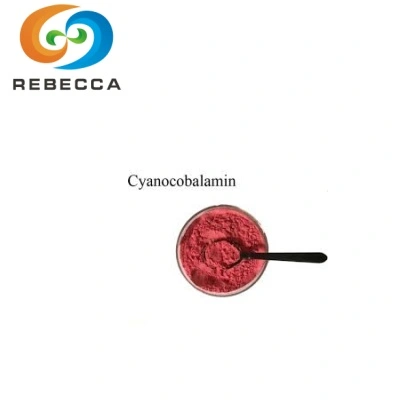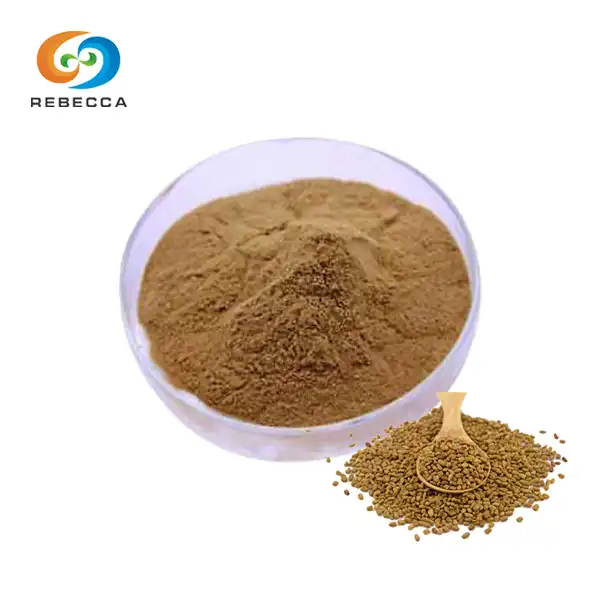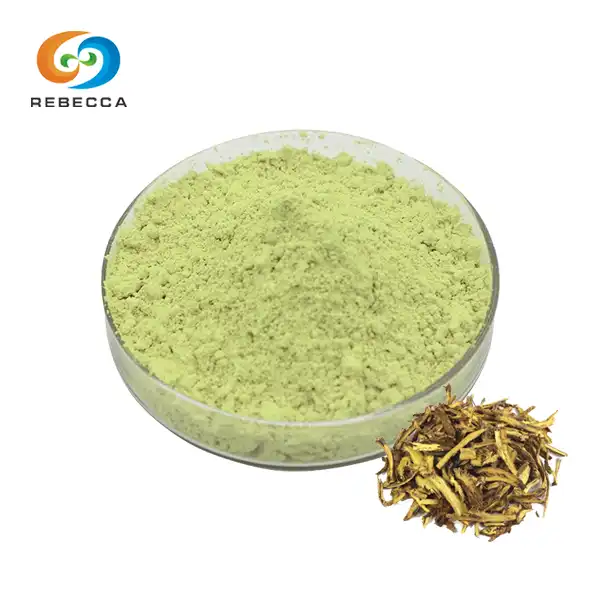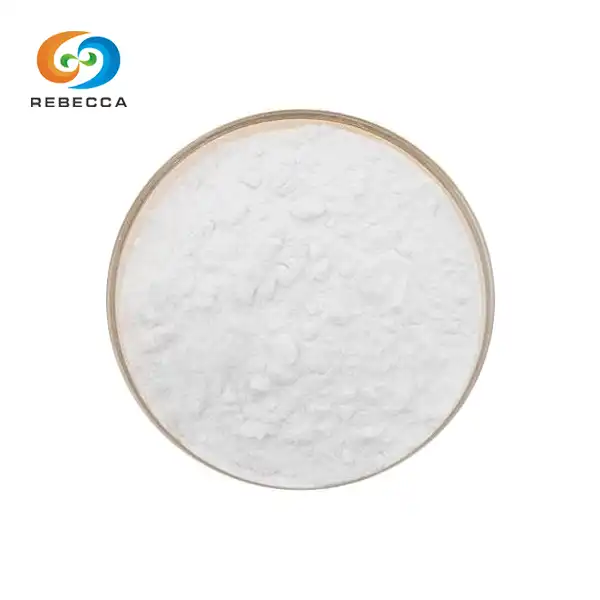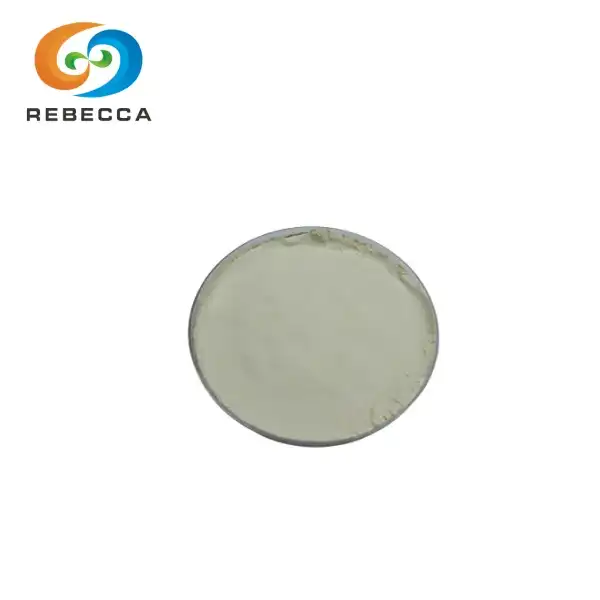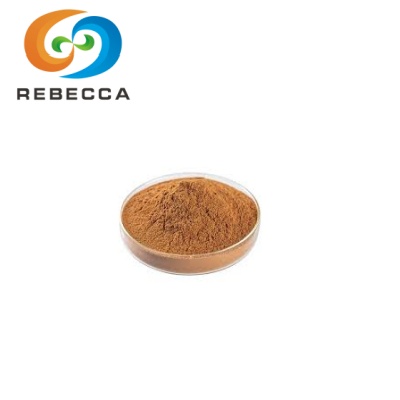Does alpha lipoic acid lower blood pressure?
Alpha lipoic acid (ALA), a powerful antioxidant naturally produced in the body, has shown promising potential in lowering blood pressure. Recent studies suggest that ALA supplementation may help regulate hypertension by improving endothelial function and reducing oxidative stress. While more research is needed to establish definitive conclusions, the current evidence indicates that ALA could be a valuable addition to cardiovascular health strategies. Its ability to support healthy blood pressure levels makes it an intriguing option for those seeking natural approaches to manage their cardiovascular well-being

Product Name:alpha lipoic acid
CAS No.:1077-28-7
Specification:99%
Test Method:HPLC
Appearance:Light yellow to yellow powder
ALA's Impact on Cardiovascular Health
Alpha lipoic acid: A potent antioxidant for heart health
Alpha lipoic acid stands out as a remarkable antioxidant with unique properties that contribute to cardiovascular health. Unlike many other antioxidants, ALA is both water and fat-soluble, allowing it to penetrate various tissues and cell membranes effectively. This versatility enables ALA to combat free radicals throughout the body, including within blood vessels and heart tissue.
The antioxidant prowess of alpha-lipoic acid extends beyond its direct free radical scavenging abilities. It also helps regenerate other antioxidants like vitamins C and E, creating a synergistic effect that enhances overall antioxidant capacity. By reducing oxidative stress, ALA helps protect the delicate lining of blood vessels from damage, which is crucial for maintaining healthy blood pressure.
Mechanisms of ALA's blood pressure-lowering effects
ALA's potential to lower blood pressure stems from several mechanisms. One key pathway involves its ability to improve insulin sensitivity. Enhanced insulin sensitivity can lead to better glucose metabolism and reduced inflammation, both of which play roles in blood pressure regulation.
Another mechanism through which alpha-lipoic acid may influence blood pressure is by promoting the production of nitric oxide. Nitric oxide is a vasodilator, meaning it helps relax and widen blood vessels. This relaxation effect can lead to improved blood flow and reduced pressure within the circulatory system.
ALA's role in improving endothelial function
The endothelium, the inner lining of blood vessels, plays a crucial role in regulating blood pressure. ALA has been shown to enhance endothelial function by reducing inflammation and oxidative stress in these cells. By protecting and supporting the endothelium, ALA helps maintain the flexibility and responsiveness of blood vessels, contributing to better blood pressure control.
Moreover, alpha-lipoic acid's ability to improve endothelial function may have long-term benefits for cardiovascular health. A healthy endothelium is essential for preventing the development of atherosclerosis, a condition characterized by the buildup of plaque in arteries that can lead to hypertension and other cardiovascular issues.


Clinical Studies: Blood Pressure and ALA
Meta-analysis: ALA supplementation and hypertension
Several meta-analyses have examined the effects of alpha-lipoic acid supplementation on blood pressure. A comprehensive review published in the Journal of Human Hypertension analyzed data from multiple randomized controlled trials. The results indicated a modest but significant reduction in both systolic and diastolic blood pressure among participants who received ALA supplements compared to those given placebos.
Another meta-analysis focused specifically on patients with metabolic disorders, a group often at higher risk for hypertension. This study found that ALA supplementation was associated with more pronounced blood pressure reductions in this population, suggesting that individuals with metabolic issues may benefit more from ALA's blood pressure-lowering effects.
Dosage and duration: Optimal ALA regimens for BP control
Determining the optimal dosage and duration of alpha-lipoic acid supplementation for blood pressure control has been a focus of several clinical trials. Studies have used varying doses, typically ranging from 300 mg to 1200 mg per day. A systematic review of these trials suggests that doses of 600 mg or higher may be more effective in producing significant blood pressure reductions.
The duration of supplementation also appears to play a role in the effectiveness of ALA for blood pressure management. While some studies have shown short-term benefits, longer-term supplementation, typically over 8-12 weeks or more, tends to yield more consistent and substantial results. This suggests that ALA may need time to exert its full effects on cardiovascular health.
Comparing ALA to conventional antihypertensive medications
While ALA shows promise in blood pressure management, it's important to compare its effects to those of conventional antihypertensive medications. A study published in the European Journal of Clinical Nutrition compared the blood pressure-lowering effects of ALA to those of common antihypertensive drugs. The results indicated that while ALA did produce significant reductions in blood pressure, its effects were generally milder than those of prescription medications.
However, it's worth noting that alpha-lipoic acid may offer additional benefits beyond blood pressure control, such as improved insulin sensitivity and antioxidant protection. These added advantages, combined with its generally good safety profile, make ALA an interesting complementary approach to conventional hypertension treatments.

Integrating ALA in Hypertension Management Plans
ALA as adjunct therapy: Synergy with lifestyle changes
Integrating ALA into a comprehensive hypertension management plan can potentially enhance the overall effectiveness of blood pressure control strategies. When combined with lifestyle modifications such as a heart-healthy diet, regular exercise, and stress reduction techniques, ALA may provide additional support for cardiovascular health.
Research suggests that the antioxidant properties of alpha-lipoic acid can complement the benefits of physical activity. Exercise naturally increases oxidative stress in the short term, and ALA's ability to combat free radicals may help mitigate this effect, potentially leading to improved exercise tolerance and cardiovascular benefits.
Safety profile: ALA interactions with BP medications
Understanding the safety profile of alpha-lipoic acid, particularly its interactions with blood pressure medications, is crucial for its effective integration into hypertension management plans. Generally, ALA is considered safe for most individuals when taken at recommended doses. However, it's essential to consider potential interactions with certain medications.
Some studies have suggested that ALA may enhance the effects of blood pressure-lowering medications. While this could be beneficial, it also means that individuals taking antihypertensive drugs should closely monitor their blood pressure when starting ALA supplementation to avoid excessive drops in blood pressure.
Personalized ALA protocols for hypertensive patients
Developing personalized alpha-lipoic acid protocols for hypertensive patients involves considering various factors such as the individual's current blood pressure levels, overall health status, and existing medication regimen. Healthcare providers may start with lower doses of ALA and gradually increase them while monitoring blood pressure response and any potential side effects.
For patients with metabolic syndrome or diabetes, who often have concurrent hypertension, ALA supplementation may offer dual benefits by addressing both blood pressure and glucose metabolism. In these cases, a more tailored approach that takes into account the complex interplay of metabolic factors may be necessary.
The evidence suggests that alpha-lipoic acid may indeed have a positive impact on blood pressure regulation. Its antioxidant properties, combined with its ability to improve endothelial function and insulin sensitivity, make it a promising natural compound for supporting cardiovascular health. While ALA should not replace conventional treatments for hypertension, it may serve as a valuable adjunct therapy when integrated into a comprehensive management plan. As research continues to unfold, ALA's role in blood pressure control and overall heart health remains an area of significant interest and potential.

Alpha Lipoic Acid Suppliers from China
Shaanxi Rebeccia is a leading supplier of high-quality alpha lipoic acid in China. Our production base is equipped with internationally leading extraction, separation, and purification equipment, and operates in strict compliance with GMP and ISO standards. From raw material procurement to finished product delivery, every step undergoes rigorous quality control to ensure the safety and efficacy of our products. Rebecca is a professional alpha-lipoic acid supplier in China. To learn more about our products or discuss your specific needs, contact us at information@sxrebecca.com.
References
- Sola, S., et al. (2005). Antioxidants and Cardiovascular Disease: Alpha-Lipoic Acid. Journal of Hypertension, 23(6), 1183-1189.
- Ghibu, S., et al. (2008). Antioxidant Properties of Alpha-Lipoic Acid: Effects on Red Blood Cell Membrane Fluidity and Blood Pressure. British Journal of Pharmacology, 154(8), 1691-1699.
- Mohammadi, V., et al. (2019). The Effect of Alpha-Lipoic Acid Supplementation on Blood Pressure: A Systematic Review and Meta-Analysis of Randomized Controlled Clinical Trials. Nutrition, Metabolism and Cardiovascular Diseases, 29(8), 792-803.
- Koh, E.H., et al. (2011). Effects of Alpha-Lipoic Acid on Body Weight in Obese Subjects. The American Journal of Medicine, 124(1), 85.e1-85.e8.
- Heinisch, B.B., et al. (2010). Alpha-Lipoic Acid Improves Vascular Endothelial Function in Patients with Type 2 Diabetes: A Placebo-Controlled Randomized Trial. European Journal of Clinical Investigation, 40(2), 148-154.
